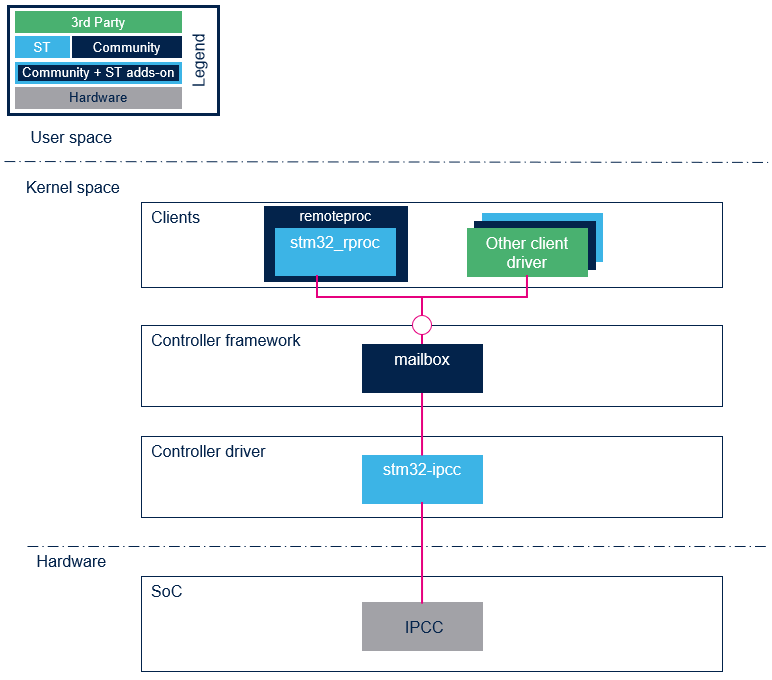This article gives information about the Linux® mailbox framework. The mailbox framework is involved in interprocessor communication in heterogeneous multicore systems.
1. Framework purpose[edit source]
The mailbox is used in interprocessor communication to exchange messages or signals between the host and the coprocessor cores. The mailbox framework is based on:
- A mailbox controller that is platform dependent:
- It is in charge of configuring and handling IRQ from the IPCC peripheral.
- It provides a generic API to the mailbox client.
- A mailbox client that is in charge of the message to send or receive.
A general presentation of the mailbox framework is available in the Linux mailbox documentation [1].
2. System overview[edit source]

2.1. Component description[edit source]
- Mailbox controller
- The mailbox controller is the stm32_ipcc. It configures and controls the IPCC peripheral
- Mailbox client
- The user can define his own mailbox client.
- For example, the RPMsg framework uses mailbox for the interprocessor communication.
- In this case the mailbox client is the remoteproc driver that forwards services from/to the RPMsg framework.
2.2. API description[edit source]
The APIs are described in the Mailbox client API [2]
3. Configuration[edit source]
3.1. Kernel Configuration[edit source]
Activate stm32 IPCC mailbox in kernel configuration using the Linux Menuconfig tool: Menuconfig or how to configure kernel
Device drivers --->
-*- Mailbox Hardware Support --->
<*> STM32 IPCC Mailbox
3.2. Device tree configuration[edit source]
Please refer to the IPCC device tree configuration.
4. How to use the framework[edit source]
The Linux mailbox documentation [1] provides with a very simple example of use.
5. How to trace and debug the framework[edit source]
5.1. How to trace[edit source]
Dynamic debug traces can be added using the following commands:
echo -n 'file stm32-ipcc.c +p' > /sys/kernel/debug/dynamic_debug/control echo -n 'file mailbox.c +p' > /sys/kernel/debug/dynamic_debug/control
- stm32-ipcc driver: drivers/mailbox/stm32-ipcc.c
6. Source code location[edit source]
- framework: drivers/mailbox/mailbox.c
- client interface: include/linux/mailbox_client.h
7. References[edit source]